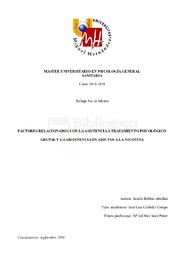Por favor, use este identificador para citar o enlazar este ítem:
https://hdl.handle.net/11000/5359Registro completo de metadatos
| Campo DC | Valor | Lengua/Idioma |
|---|---|---|
| dc.contributor.advisor | Carballo Crespo, José Luis | - |
| dc.contributor.advisor | Sanz Pérez, María del Mar | - |
| dc.contributor.author | Beltrán Abellán, Sandra | - |
| dc.contributor.other | Departamentos de la UMH::Psicología de la Salud | es |
| dc.date.accessioned | 2019-10-22T11:13:34Z | - |
| dc.date.available | 2019-10-22T11:13:34Z | - |
| dc.date.created | 2019-09 | - |
| dc.date.issued | 2019-10-22 | - |
| dc.identifier.uri | http://hdl.handle.net/11000/5359 | - |
| dc.description.abstract | Objetivos: Analizar la relación entre variables relacionadas con la adicción al tabaco y otras variables psicológicas y la adherencia y el éxito del tratamiento psicológico grupal de la adicción a la nicotina. Método: Estudio descriptivo de tipo longitudinal. Participaron 23 hombres y mujeres con una media de edad 56,13 años de los cuáles un 69,56% era la primera vez que asistía al grupo de tratamiento. Se emplearon herramientas de evaluación para medir las variables relacionadas con la dependencia al tabaco y otras variables psicológicas y posteriormente se realizaron análisis estadísticos para comprobar si las variables seleccionadas podrían estar relacionadas con la adherencia al tratamiento y la abstinencia a la nicotina. Resultados: Respecto a la adherencia, no se encontraron diferencias estadísticamente significativas entre los grupos de adherencia (GA) y no adherencia (GNA) para las variables analizadas. En cuanto a la abstinencia, se hallaron diferencias estadísticamente significativas a favor del grupo de no abstinencia (GNABS) en las variables dependencia física (Z=2,037; p< ,05) y número de cigarrillos que fumaban antes de comenzar el grupo (Z= 2,271; p< ,05). Conclusiones: Continuar investigando acerca de las variables relacionadas con la adherencia terapéutica y la abstinencia a la nicotina podría permitir la creación de un modelo que ayude a predecir la asistencia a las sesiones de tratamiento y el éxito del mismo. | es |
| dc.description.abstract | Objective: Analyse the relation between variables related to tobacco addiction, psychological variables and therapy adherence and psychological group treatment success. Method: Descriptive and logitudinal study. 23 men and women with average age of 56,13 years participated, of which 69,56% was the first time they attended the treatment group. Evaluation tools were used to measure variables related to tobacco dependence and other psychological variables and later statistical analysis were performed to check if the selected variables could be related to therapy adherence and nicotine abstinence. Results: The results showed that regarding adherence, no statistically significant differences were found between adherence group (GA) and non adherence group (GNA) for the variables analysed. In terms of abstinence, statistically significant differences were found in the variables physical dependence (Z=2,037; p< ,05) and the number of cigarettes smoked before starting the group (Z= 2,271; p< ,05). Conclusions: Further research on variables related to psychological therapeutic adherence and nicotine abstinence could allow the creation of a model that helps predict the treatment sessions attendance and its potential effectiveness. | es |
| dc.format | application/pdf | es |
| dc.format.extent | 27 | es |
| dc.language.iso | spa | es |
| dc.rights | info:eu-repo/semantics/openAccess | es |
| dc.subject | Adicción | es |
| dc.subject | Tabaco | es |
| dc.subject | abstinencia | es |
| dc.subject | Nicotina | es |
| dc.subject | adherencia terapéutica | es |
| dc.subject.other | CDU::1 - Filosofía y psicología::159.9 - Psicología | es |
| dc.title | Factores relacionados con la asistencia a tratamiento psicológico grupal y la abstinencia en adictos a la nicotina | es |
| dc.type | info:eu-repo/semantics/masterThesis | es |
| dc.type | info:eu-repo/semantics/masterThesis | es |

Ver/Abrir:
BELTRAN Sandra TFM.pdf
557,24 kB
Adobe PDF
Compartir:
 La licencia se describe como: Atribución-NonComercial-NoDerivada 4.0 Internacional.
La licencia se describe como: Atribución-NonComercial-NoDerivada 4.0 Internacional.
.png)